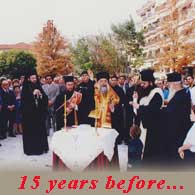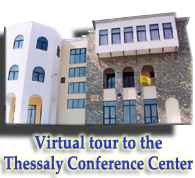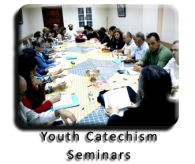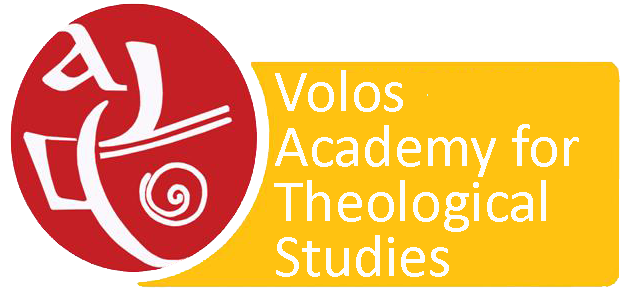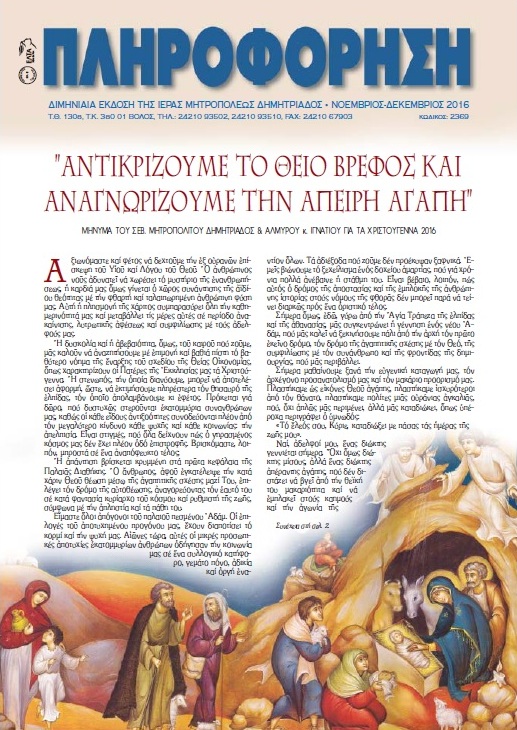The 4th Clerical Synaxis of Holy Metropolis of Demetrias
The 4th Clerical Synaxis of Holy Metropolis of Demetrias was held today for the current Missionary year.
Regarding the general issue on Heresies and Sects, upon which our Clerics are educated, Very Rev. Vasileios Georgopoulos, Associate professor in Aristotle University, gave the first speech with the title: "Protestantic Fundamentalism"
Rev. Vasileios mentioned that the term Fundamentalism comes from the latin word fundamentum meaning foundation and declares the return, the acceptance and the obsession to the foundations, to the roots of a religious belief or of a credo in general, though the initiate meaning of the term started from a religious field but now has spread to the fields of politics and ideology.
Protestantic Fundamentalism showed up in U.S.A. the first quarter of 20th Century with certain aim to:
a) Fend off the validity and the clarity of traditional Christian belief from modern and liberal theological doctrines of the era.
b) React to scientific theories and practices which ,in the opinion of its followers, threatened the authority of Holy Scripture in particular and the Christian teaching in general.
The strong dispute of the traditional protestant Christian doctrines in relation to the propaganda of ideas for the omnipotence of science, created suspicion and reactions among hundreds of pastors, preachers and followers of several branches of American protestant area.
All the above, even if they differed from each other and despite their inside administrative division and fracture, sought for a common way of defense towards to whatever they thought to be a threat for the foundations of traditional Christian belief. This reaction was expressed as an interdoctrine movement of contradiction towards the intrusion of modern and radical, theological and scientific theories.
The followers of Protestant Fundamentalism, whereas they came from different protestant denominations, had agreed to defend and exclusively accept as a benchmark of their unity five theological principles towards academic radical theology:
1) Following the divine inspiration and the Biblical infallibility.
2) The supernatural birth of Christ from Virgin Mary and the acceptance of His deity.
3) The assumption of the cruciform sacrifice of Christ as a necessity of Divine Command.
4) The Resurrection of Christ.
5) His return in the Second Coming along with the Last Judgment of all people.
Protestant Fundamentalism from the first moment of its appearance claims the exclusive consistence in traditional protestant version of Protestantism, whereas at the same time it chooses parts of teaching and ethics which by definition are defined as fundamental.
It is about a movement with different tendencies and gradations of attitudes which is spread or defends with evident aggressiveness. They have a sense of exclusivity and they express the claim that the rest Christian world has defected as a whole. Therefore, only their side is right and fair and the other side is always wrong.
Dashing from a basic belief- a dream of many protestant professions which is the return to primeval roots of Christianity, since they have vanished in their opinion, Protestant Fundamentalists, utilizing this wish and self-congratulating as an expression of Christian clarity, find an alibi for the verbal assault against the rest Christian branches, even against the protestant area they come from.
The researchers of the phenomenon point out that in Protestant Fundamentalism simultaneously the political version coexist with the meaning of the enforcement of their religious beliefs through politics. Protestant Fundamentalists claim with the same unconditional and monolithic way not only religious, social but political representation as well in U.S.A. area.
The next speaker was His Eminence Metropolitan Sissaniou & Siatistis Mr. Pavlos, who developed the topic "Heresies and Sects, a threat for the Orthodox belief and culture"
In a few words, His Eminence posing the question how important threat is towards our Orthodox belief and culture all these Heresies and Sects, mentioned the following:
The Church had never fear for the research and the truth because its head has been the Christ who is the route and the truth Himself. Each individual is free but responsible for his choices. The Church is not in danger of other people's Religious faith .The objection of the Church lies on the fact that Religious faith becomes a cover for other causes and purposes. Particularly, when some, in the name of Orthodoxy, try to preach the gospel truth differently from the Gospel of the Church. Religious freedom is violated where propaganda is exerted with wrong facts and deceitful statements in order unsuspecting citizens to be trapped.
What our Church calls a threat is the use of Christian terms from non-mainstream sects in order to claim their doctrines and trap gullible citizens. The use of such terms by these groups enables them to avoid a face-to-face debate with Christianity and to corrupt Christianity from the inside by attributing to these terms a different or even reverse meaning and context.
Then, His Eminence answered the question if heresies and non-mainstream sects are a threat towards our Culture; The answer is given by the European Parliament which has studied in detail the topic and reached the conclusion that non-mainstream sects, or extreme heresies as they have been characterized, constitute a threat towards young people's personality and towards our culture. Consequently, the European Parliament acknowledges the danger and the issue and invites all member-states into cooperation for their confrontation. In the field of politics and Church, it has been a realization already that the action of these non-mainstream sects sets in danger the people, the society and the culture. The dangers of these groups are the following:
A) The totalitarian character of these groups.
B) The demolition of human personality through the wash-out method.
C) The fact that they do not permit any criticism on their attitudes and
D) Non-mainstream sects highlight a perception about human being which is characterized by monism and holistic assumption. These basic doctrines disallow freedom and personal responsibility of human being.
In the end, His Eminence reached the following conclusions:
1. It is clear and obvious that contemporary heresies and sects are a threat.
2. Against this threat, the Church's duty is to delimit the Orthodox faith.
3. It is essential that Societies- here and there- realize and local Churches remind that the actions of non-mainstream sects are a political issue as well.
4. The non-mainstream sects strike religious freedom and trample on human rights of their victims.
5. Local Churches through study, cooperation and responsibility, should reveal the true face of those non-mainstream sects.
6. From our Clerical position, we should make prominent the real identity of the issue, realizing that Orthodoxy can offer real and diachronic solutions to society's dead-ends and to the existential gaps which were created by the secularity and rationalism.
A discussion upon the proposals and a summary of the conclusions followed by His Eminence Metropolitan Mr. Ignatius.










